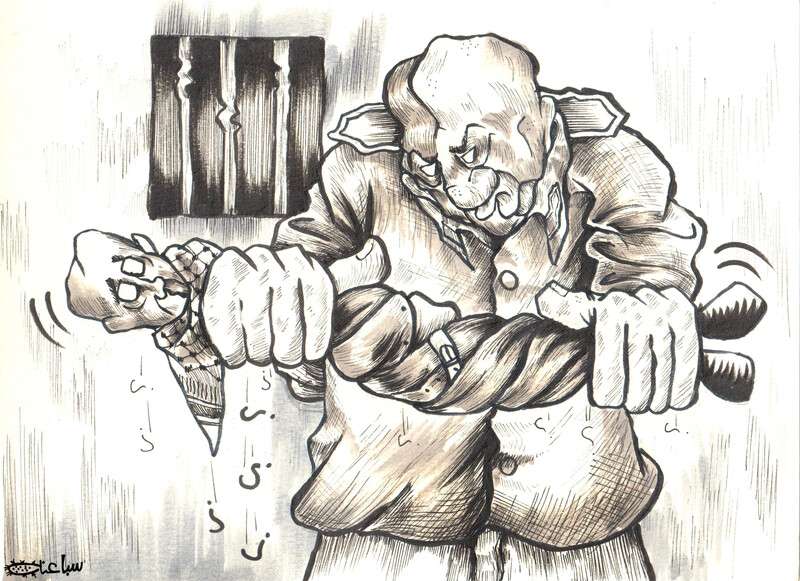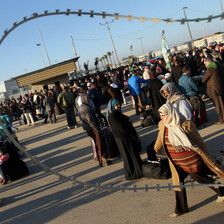The Electronic Intifada Beirut 25 August 2015

A Palestinian journalist was shocked when more than a dozen Syrian security officers showed up to arrest him in July 2013. They approached his table at a Damascus bar, yanked him from his seat and dragged him to a police car.
The journalist, who asked not to be named due to ongoing safety concerns, believes he was targeted because he had opposed the government of President Bashar al-Assad.
“I was shocked – all these soldiers just for me,” said the journalist, who lived in Yarmouk, a Palestinian refugee camp in Damascus. “I had only participated in civilian protests; it was civil resistance. We just expressed our opinions.”
Along with many other Yarmouk-based activists, he had taken part in a number of demonstrations. The protests had run from the time the uprising against Assad began in March 2011 until more recent years, when many residents of the camp were protesting the Syrian army’s siege of Yarmouk.
The journalist, who is now 32, was taken to a nearby police station, where he was beaten and questioned for hours. He was jailed in a small room in a basement with more than 100 other prisoners, who were forced to sit side-by-side in only their underwear.
“I imagine Syrian prisons are the worst prisons in the world,” he recalled. “There was one bathroom for all of us and only one water faucet — for bathing, for drinking, for everything.”
“Of course, there was violence, hitting, torture … during the interrogations,” he said. “They would beat me and curse at me, trying to get information from me — about my work as a journalist. But everything I’d written about Syria wasn’t published in my name, so they had nothing on me.”
Writing as a freelance contributor for several Arabic-language publications, he was also a regular contributor to a journal close to a leftist Palestinian faction. While covering stories on Palestine, he said, he used his real name.
However, when he wrote critical analysis and opinion pieces supporting the uprising in Syria, he used a pen name.
“I had a script and I stuck to it,” he explained. “I said ‘I support the regime and that the regime supports Palestine more than anyone else.’ One of them [prison guards] stomped on my face repeatedly. But no matter how much they beat me I kept saying the same thing. I think that’s why I survived. I’m so lucky.”
Weight loss
For two and a half months, he remained behind bars, often getting sick from the poor conditions and the dirty water and food. “Throwing up, diarrhea — the last day before I was released I had to go to the bathroom 23 times. I was very sick,” he said.
“My mother didn’t recognize me because I had lost so much weight,” he recalled, adding that a doctor later told him he had been suffering from severe skin and stomach infections.
Fearing the possibility of rearrest, he was eventually smuggled out of the country and into Lebanon. He has been unable to obtain a residency permit from Lebanese authorities, who impose strict restrictions on Palestinian refugees, including banning them from more than 70 professions.
The journalist now lives in Shatila, an overcrowded Palestinian refugee camp in Beirut. His family has fled Yarmouk to another area near Damascus.
Around 260,000 Palestinian refugees in Syria have been described as “internally displaced” by the UN.
The total number of Palestinian refugees in Syria had stood at 560,000 a few years ago. Yet it has now been reduced to 480,000 — with 95 percent of those remaining in need of humanitarian assistance.
Jordan effectively sealed its borders to Palestinian refugees from Syria early in the civil war, with Lebanon doing so in May this year.
No escape
Yarmouk, south of Damascus, has been largely destroyed. Once home to 150,000 Palestinians and Syrians, the number inhabitants fell to 18,000 earlier this year.
In April, Islamic State, also known as ISIS or ISIL, launched an offensive on Yarmouk and took over some 90 percent of the camp.
After battling with Palestinian factions in the camp, most Islamic State fighters eventually withdrew to the surrounding areas. The group still maintains a presence in Yarmouk, however.
According to the UK-based Action Group for Palestinians in Syria, nearly 3,000 Palestinians have been killed in Syria’s civil war. Meanwhile, at least 943 Palestinians are detained in Syrian prisons and another 277 are believed to have been abducted.
Yet that number is likely much higher because many families of detainees are scared to speak out, according to Wesam Sabaaneh, coordinator at the Jafra Foundation for Relief and Youth Development, a group that works with Palestinian refugees in Syria.
“Palestinians in Syria suffer badly when we are targeted — we are already refugees,” Sabaaneh told The Electronic Intifada. “There is almost no escape from Syria when Lebanon and Jordan shut the borders on us.”
Patrick O. Strickland is an independent journalist and regular contributor to The Electronic Intifada. Website: www.postrickland.com. Twitter: @PStrickland.





